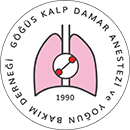

Anesthetic Management in Aort Valve Surgery with Infective Endocarditis Following Transcatheter Aortic Valve Implantation
Elvin Kesimci1, Tülin Gümüş1, Serkan Taştan1, Abdülkadir But2, Orhan Kanbak11Anesthesiology And Reanimation Clinic, Ankara Atatürk Education And Research Hospital, Ankara, Turkey2Anesthesiology And Reanimation Department, Yıldırım Beyazıt University; Ankara, Turkey
Introduction: Transcatheter aortic valve implantation (TAVI) has emerged as an alternative curative therapy in patients with severe calcific aortic stenosis in aging population, in which there is high operative rate with surgery due to significant co-morbidities. However, problems during and after procedure can seriously complicate the success of TAVI. We present the anesthetic management of a patient with infective endocarditis, undergoing aortic valve replacement surgery following TAVI.
Case Report: A 75-year-old woman who had undergone TAVI five months before was readmitted to hospital with complaints of palpitation, breathlessness and fever. The blood culture was positive for Enterococcus faecalis, so antimicrobial therapy was started with a diagnosis of infective endocarditis. She was intubated due to acute lung edema and acidosis; and also needed dialysis. Transesophagial echocardiography (TEE) showed vegetation on right coronary cusp of the implanted aortic valve. The patient underwent cardiac surgery for removal and replacement of the infected and malfunctioning TAVI valve. At the end of the surgical procedure, she was transferred to the intensive care unit (ICU) on inotropic support. However, in ICU, hemodynamic instability, including rhythm disturbances, persisted and intra-aortic balloon pump was inserted. Postoperative course was complicated with low cardiac output syndrome and organ failure. Unfortunately, the patient died at 10th postoperative hour in spite of all supportive management.
Conclusion: The reported incidence of prosthetic valve endocarditis after TAVI patients is less than 0.5%. However, the mortality rate varies from 30% to 50% and urgent open heart surgery with meticulous anesthesiological planning is required.
Keywords: transcatheter aortic valve implantation (TAVI), infective endocarditis, aort valve surgery
Transkateter Aort Kapak İmplantasyonu Sonrasında Gelişen İnfektif Endokarditli Aort Kapak Cerrahisinde Anestezi Yönetimi
Elvin Kesimci1, Tülin Gümüş1, Serkan Taştan1, Abdülkadir But2, Orhan Kanbak11Ankara Atatürk Eğitim Ve Araştırma Hastanesi, Anesteziyoloji Ve Reanimasyon Kliniği, Ankara2Yıldırım Beyazıt Üniversitesi, Anesteziyoloji Ve Reanimasyon Ana Bilim Dalı, Ankara
Giriş: Transkateter aort kapak implantasyonu (TAVI) belirgin ko-morbiditeler nedeniyle cerrahi riski oldukça yüksek, ciddi, kalsifik aort stenozu olan yaşlı popülasyonda, alternatif bir tedavi olarak ortaya çıkmıştır. Ancak, işlem sırasında ve sonrasında gelişebilecek problemler TAVI' nin başarısını olumsuz etkileyebilir. TAVI sonrası infektif endokardit gelişen ve cerrahi aort kapak replasmanına alınan bir hastada anestezik yaklaşımımızı sunmak istedik.
Olgu Sunumu: : 75 yaşında, 5 ay önce TAVI geçirmiş bayan hasta çarpıntı, nefes darlığı ve ateş şikayetleri ile hastaneye başvurmuştur. Kan kültürü Enterococcus faecalis için pozitif olan hastaya infektif endokardit tanısıyla antimikrobiyal tedavi başlanmıştır. Sonrasında akut akciğer ödemi ve asidoz nedeniyle entübe edilen hasta diyalize de alınmıştır. Yapılan transözefageal ekokardiyografide (TEE); implante edilmiş aortik kapağın sağ ucunda vejetasyon saptanması üzerine hastaya aort kapak replasman cerrahisi uygulanmasına karar verildi. Operasyon sonunda, hasta inotropik destek tedavisi ile yoğun bakım ünitesine alındı. Ancak, hastanın hemodinamik instabilitesi ve ritm bozuklukları ısrarla devam edince hastaya intraaortik balon pompası takıldı. Postoperatif dönemi düşük kardiyak output ve organ yetmezlikleri ile seyreden hasta postoperatif 10. saatte tüm destek tedaviye rağmen kaybedildi.
Sonuç: TAVI sonrası protez kapak endokarditinin insidansı % 0.5 olarak bildirilmektedir. Ancak bu komplikasyona bağlı mortalite oranları % 30-50 arasında değişmektedir. Bu nedenle bu hastalarda acil açık kalp cerrahisi için özenli bir anestezi planına ihtiyaç duyulmaktadır.
Anahtar Kelimeler: transkateter aort kapak implantasyonu (TAVI), infektif endokardit, aort kapak cerrahisi
Manuscript Language: Turkish
(1392 downloaded)

















